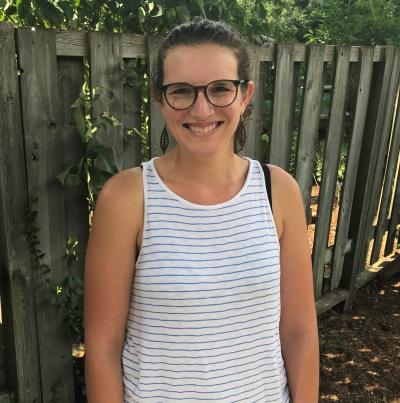Katie D'Amico-Willman
2021 TPS Alumna
Current Employment

Postdoctoral Researcher, Phytobacteriology Lab at North Carolina State University
Education
- PhD, Translational Plant Sciences, The Ohio State University, 2021
- MS, Conservation Biology, SUNY College of Environmental Science and Forestry, 2012
- BS, Biology, John Carroll University, 2008
Research Focus
As a master’s student Katie’s research focused on the potential non-target impacts of a transgenic American chestnut with enhanced blight resistance. Before starting her PhD program at Ohio State, Katie worked for the USDA Agricultural Research Service at Cornell University in a Pseudomonas systems biology lab. Katie’s PhD research focused on plant aging and its effect in perennial species. To accomplish this, she used non-infectious bud-failure in almond (Prunus dulcis) as a model system.
TPS Experience
- Rotations: Dr. Enrico Bonello & Dr. Joshua Blakeslee
- Advisors: Dr. Jonathan Fresnedo Ramirez (primary) & Dr. Andy Michel
- Internship: College of Wooster, Department of Biology
Grants & Awards
- 2020 University of Washington Summer Institute in Statistical Genetics Scholarship
- 2019 HCS Graduate Research Symposium Poster Competition, Second Place
- 2019 CFAES Research Conference Doctoral Poster Competition, Second Place
- 2019 ASPB Midwest Graduate Student Oral Presentation Competition, First Place
- 2018 ASPB Midwest Section Travel Grant
- 2018 Council of Graduate Students Ray Travel Award for Service and Scholarship
- 2018 SEEDS: OARDC Research Enhancement Competitive Grants Program recipient
- 2017 Alumni Grant for Graduate Research and Scholarship
- 2017 Sigma Xi Scientific Research Honor Society Inductee, Associate Member
- 2016 Honorable Mention; National Science Foundation Graduate Research Fellowship
- 2016 Sigma Xi Grant-in-Aid of Research recipient
Publications
D'Amico-Willman, K.M., Anderson, E.S., Gradziel, T.M. and Fresnedo-Ramirez, J. (2021). Relative telomere length and telomerase reverse transcriptase (TERT) expression are assocaited with age in almond (Prunus dulcis [Mill.] D.A. Webb). Plants, 10(2), 189.
Conrad, A.O., McPherson, B.A., Lopez-Nicora, H.D., D'Amico, K.M., Wood, D.L, and Bonello, P. (2018). Disease incidence and spatial distribution of host resistance in a coast live oak/sudden oak death pathosystem. Forest Ecology and Management 433, 618-624.
D’Amico, K., and Filiatrault, M. (2017). The conserved hypothetical protein PSPTO_3957 is essential for virulence in the plant pathogen Pseudomonas syringae pv. tomato DC3000. FEMS Microbiology Letters 364.
Butcher, B. G., D’Amico, K., Chakravarthy, S., Coster, M., and Filiatrault, M. (2017). Virulence of Pseudomonas syringae is modulated through the catabolite repression control protein Crc. Molecular Plant-Microbe Interactions 30, 283-294.
Butcher, B., Chakravarthy, S., D’Amico, K., Stoos, K.B., and Filiatrault, M. (2016). Disruption of the carA gene in Pseudomonas syringae results in reduced fitness and alters motility. BMC Microbiology 12, 194-209.
D’Amico, K.M., Horton, T.R., Maynard, C.A., Stehman, S.V., Oakes, A.D. and Powell, W.A. (2015). Assessing Ectomycorrhizal Associations on Transgenic American Chestnut Compared to the Wild Type, a Conventionally-Bred Hybrid, and Related Fagaceae Species. Applied and Environmental Microbiology 81, 100-108.
Park, S.H., Bao, Z., Butcher, B.G., D’Amico, K., Xu, Y., Stodghill, P., Schneider, D.J., Cartinhour, S., and Filiatrault, M.J. (2014). Analysis of the small RNA spf in the plant pathogen Pseudomonas syringae pv. tomato strain DC3000. Microbiology 160 941-953.
Park, S.H., Butcher, B.G., Anderson, Z., Pellegrini, N., Bao, Z., D’Amico, K., and Filiatrault, M.J. (2013). Analysis of the small RNA P16/RgsA in the plant pathogen Pseudomonas syringae pv. tomato strain DC3000. Microbiology 159, 296-306.
D’Amico, K.M. (2012). Assessing Ectomycorrhizal Associations on Chestnut: Comparing Transgenic, Wild-type, a Conventionally-bred Hybrid and Related Fagaceae Species. Masters Thesis. SUNY College of Environmental Science and Forestry.
